This week, they placed screens in the courtoom that protect the identities of the women who were victims of sexual violence as they gave their testimony. With them in the courtroom were representatives of the Ancestral Ixil Indigenous, Maya Achi women, who are also survivors of sexual violence in Rabinal during the Internal Armed Conflict, as well as members of the AJR from the Ixcán region.
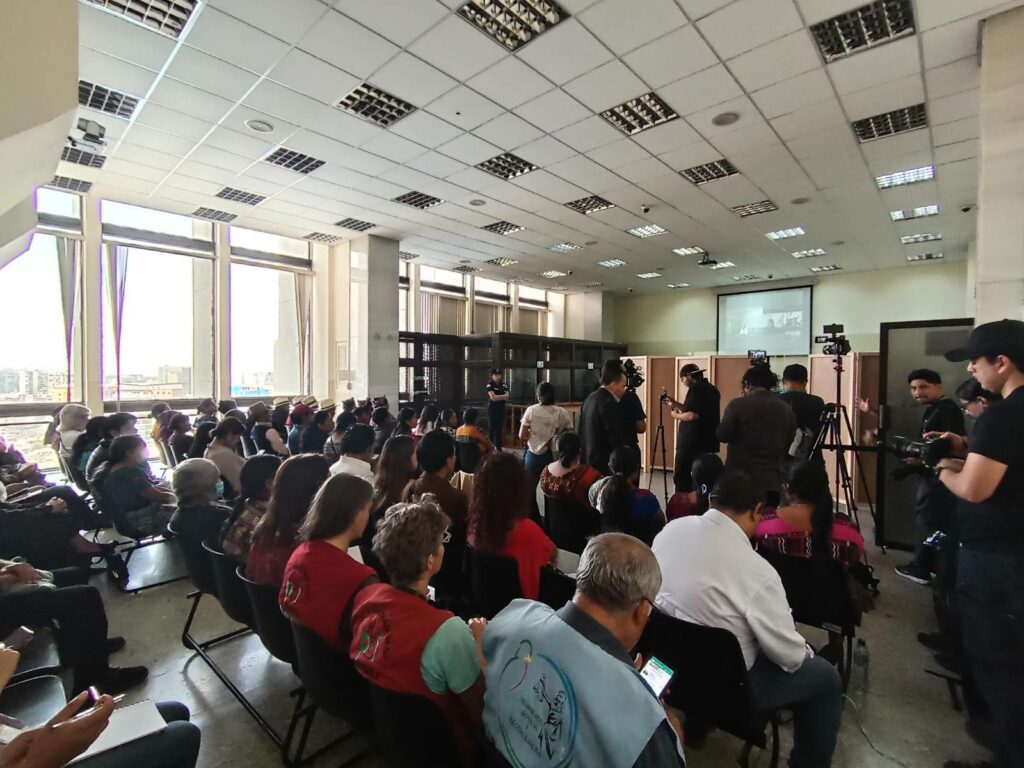
Photo by NISGUA. Guatemala City courtroom, April 2024.
Monday, April 22nd, 2024
- First witness, 50 years old. Chajul.
“That day the soldiers arrived around 11 am. I saw helicopters pass over, and at first I thought that it was fun. It was like seeing vultures fly overhead. I never thought that they would arrive and kill people. Around 2pm, the bombs started to drop. We took refuge behind our house and hid behind the plants. When the helicopters landed, they blew the foliage around.
“We hid in a house where there were various women. I told my sister that we should flee, but she said no because of her children. There was another girl there who wanted to flee with me.” The witness and the other girl started running away, and the soldiers started shooting at them.
“I jumped in the river, even though I was scared that I was going to drown. I thought I was far away from the house, but I was a little girl, and didn’t realize that I was going in a circle and was going to end up there again. We thought we had gone far, but at 10 we heard people screaming, and saw that there were soldiers coming with lanterns, helmets and backpacks. The other girl with whom I had escaped told me not to move and to let them pass.
“The next day, we were suffering from hunger, and we decided to walk, found two eggs, and we ate them raw. When we got to another house, I saw people gathered, and I thought they were praying. But when I looked more closely, I realized they were dead. They had been hung.
“The girl who I ran away with told me she wanted to go see her mother. But it seemed that she had escaped because we did not find her. We saw the rest of the houses, and the soldiers were there surveilling the bodies of the people they had killed.
“We started running and crossed the river, and got right to where the soldiers were. They tied us up, and told some other soldiers to watch us. This was when they took advantage of us. I saw when they grabbed the other girl. I saw when they started to rape her. They said to me, “What are you looking at? You’re next.
“I lost consciousness. It was very intense. I lost my sense of time. It was really horrible. I remember the first person who raped me. Then other people did. It was much more than one person. I will never forget these dates. They arrived on the 16th of February. They raped me on the 17th. These dates will stay with me until the day that I die.
“The soldiers left us there to die. On the 20th of February, a man showed up looking for his relatives. He picked me up and asked me what had happened to me. Little by little, I began to react, and realized my whole body was covered in bruises, and I began to bleed out of my vagina.
“The man took me to a river, took off his boot, washed it, and gave me water from his boot. The man cured me with plants. I was sick for a long time. I could barely walk, and every time I did, I would bleed.
“We were not combatants. My sister had just given birth, and that’s why I was there, to be with her. There were women and girls that we found hung. One was decapitated, another with her limbs cut off. These people were exhumed up, so you could get evidence from the forensic foundation (FAFG).
“What I want is for them to go to prison. Justice. I don’t want other children to live through this, which ultimately left us in poverty. It left us without education. We have the capacity, but we were not able to because of poverty, because we did not have our mothers and fathers to give us these things.”
- Second witness, 60 years old. Ilom
“I’m an Ixil woman, and by 1981 I was already married. My son was eight months old. On the 12th of January of 1982 in Ilom , the soldiers got us all together. They took 16 people from the community, and two of them ended up dead. They grabbed me, took away my child, and they raped me. There were 6 soldiers that raped me. I suffered from many problems afterwards.
“On March 23, 1982, the soldiers called us once again to a meeting at 5 am. They told us all to go to a space that was like a market. The soldiers stood on a hill, and from there, they shot at the market. They killed 80 people that day. What’s worse, the mayor told us to take food to the soldiers. They were having a party with a pig that they were cooking. Something like 80 people died that day. We had to leave because they burned the house we lived in.
“My 8-month old child died two months after the soldiers arrived in my community. He died at the Finca. I buried him. Many other children also died there.
“I demand justice, we are already close to death, but we have families, and we don’t want these things to happen to them.”
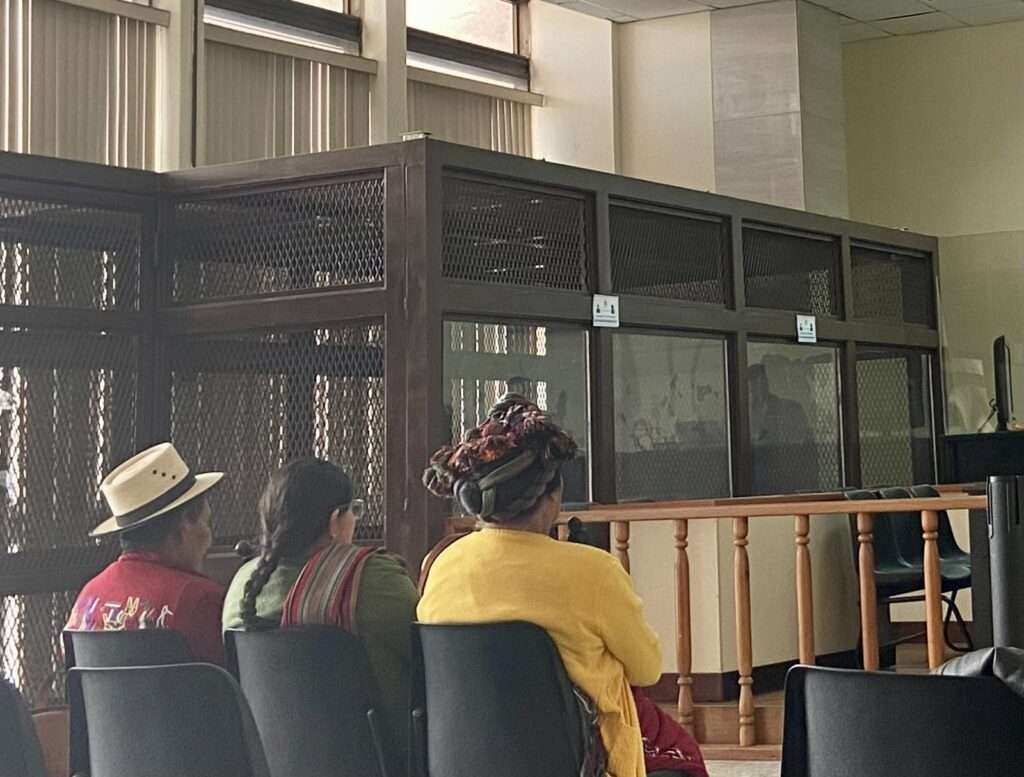
Ancestral Indigenous Authorities of the Maya Ixil People accompany the Lucas García genocide trial. Photo by NISGUA. Guatemala City. April 2024
Tuesday April 23rd, 2024
- Third witness, 60 years old, from Ilom Chajul
The witness presented her testimony about the sexual violence she experience between January 15 and 22 of 1982 in the village of Ilom, when she was 17 years old.
The witness was in her house because she had recently given birth. Her son was 15 days old when he died. The witness lived with her in-laws and husband when a group of soldiers arrived at her house at around 10pm on the 15th of January. She was raped that night by multiple soldiers, who called her “María” the whole time, a racist slur used against Indigenous women.
“I don’t know why they did these things to us. I don’t know what fault we had. We just lived in our village, we had not done anything. Since then, I have suffered from a disease. We lived in fear because we thought at any moment they might come back again.”
The soldiers kidnapped many people from the community, including her father-in-law, whose body they left on a rock on the road, as they left the community, shooting their guns at approximately 3 am.
“It’s unforgivable what they did. They treated us like dogs. I’m telling the truth of the suffering I experienced at the hands of the soldiers. They hurt me.”
Her testimony continues with the March 23rd Massacre, when the soldiers came back to Ilom. They called a meeting and separated the men from the women. They made the women enter the town hall, and made the men enter the Catholic church. They took the men over one by one, and shot some of them. The women that were in the town hall, the witness among them, saw everything from a window. That day, her father, her three brothers, and her husband were all killed. “There was so much blood spilt that day.”
After killing the men, they told the women to quickly get food for the soldiers and leave because they were going to burn their houses.
“I cannot ask for anything else besides justice, that’s what I ask for. And that my children, and my grandchildren never have to live through this. I suffered this experience, and had to overcome it, but I don’t want them to live through that.”
- Fourth witness, Estrella Polar
In March 1982, the witness lived in Estrella Polar. She had two children, one about two years old and a newborn. When the soldiers arrived, she ran with one of her children, but the place was already surrounded by soldiers:
“They stopped me, grabbed me and pushed me. I was carrying my son, they grabbed him and threw him. They took off my clothes, they did something bad to me. I’m ashamed to say it, but they raped me. I don’t know how many there were, when they were done they left me lying there.”
“It’s a little embarrassing what I’m going to say about the core of my body. I felt pains in my belly, stomach, heart, my uterus came out of my body.” The witness was only able to get medical attention to the detachment of her uterus after returning from the mountains.
When she regained consciousness she looked for her son and found him alive in the woods. “At that moment I asked myself many questions, ‘where am I? what is happening? where am I going to go?’ While it was getting dark I stayed among the trees with my son, I felt sick, dazed. The next day I realized the reality and I went walking among the trees, rocks and mountains to hide. I got to the mountains, but it didn’t end there, the soldiers were always looking for us, they treated us like animals.”
In the mountains she managed to find her husband and one of her children, they also met other people, including children: “Sometimes they shot at us, sometimes they used bombs, they were always chasing us, we had nothing to eat, no water. They burned all the houses in Estrella Polar and put a military post in Estrella Polar so they could hunt us down.”
The witness told the court that they spent approximately three years in the mountains, moving continuously.
“The reason I come here is because I have many illnesses, ailments, in my heart, in my body. What I want is justice, for what they did to my body, when they raped me. I ask for justice, for everything they committed.”
- Fifth witness, Estrella Polar.
The witness said that the army came to her community and called a meeting. They separated the men and the women and locked them all together with their children in a house that was full. The men were killed, among them her brothers and uncles.
Later, the witness recounted her life in the mountains:
“We lived in the mountains, without shelter, without food, always fleeing from helicopters. As we fled, when they chased us, we scattered and many men and women got lost.”
“I am not the only victim, there are many people who were killed. I wonder what is going to happen to those who did this. They took our land, our clothes, our crops. What is going to happen for this suffering they caused us. What I ask for is justice for the person who ordered the murder of the men and the extermination of my relatives.”
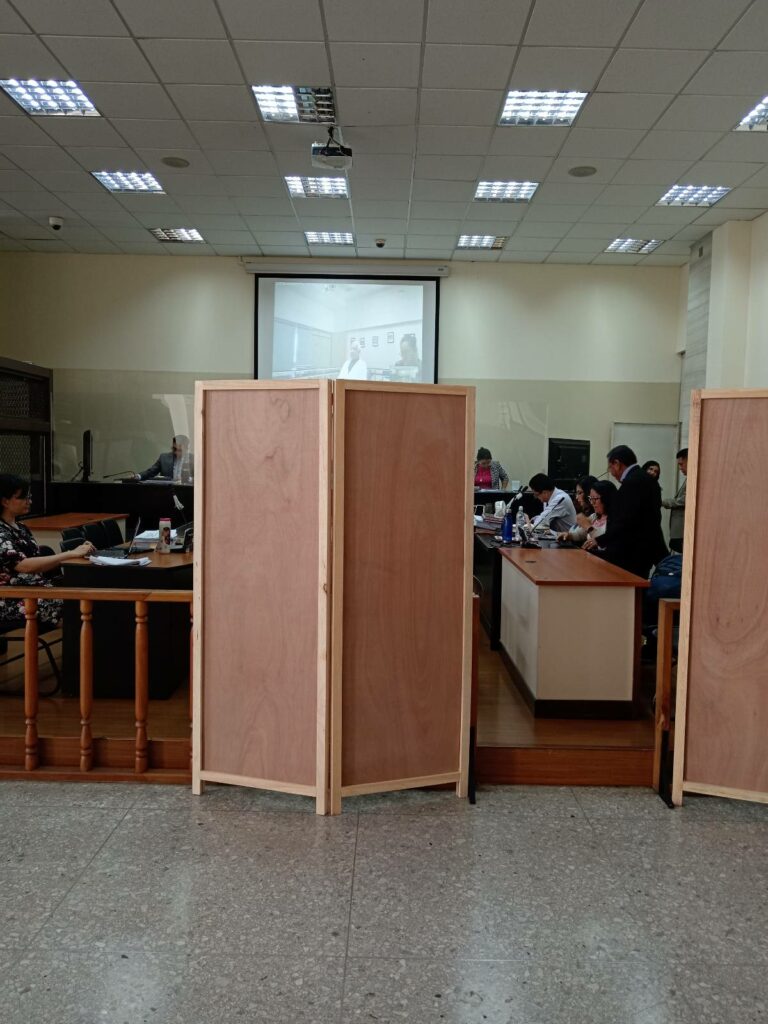
Screens in the courtroom that protect the identities of the women who were victims of sexual violence as they gave their testimony.Photo by NISGUA. Guatemala City, April 2024.
Thursday, April 25th, 2024
- Sixth witness, 60 years old, originally from Xolcuay, Chajul
On January 10, 1982, the witness was 20 years old and had three children, the oldest two years old and two twins that were 15 days old. “We were harvesting corn when soldiers arrived with their faces painted black and red uniforms, at about 12 noon. I was with my in-laws, and since it was the middle of the day, the soldiers ate the tamales we had on the griddle. The soldiers asked if my husband was there and took my father-in-law out of the house.”
Later, several soldiers returned to the house again, took away the baby she was carrying and threw him on the ground and sexually abused her. “There were several soldiers inside my house, I could not defend myself because there were many of them, several rape me and I could only scream, they hurt me a lot, but by the grace of God I am alive.”
She then fled to the coast for a year, along with her children and in-laws.
“My heart was sad, because they killed my father and my two-year-old baby died of illness. That is why I have come today, I come here for my rights, because of the pain I have in my heart. I can’t stand the sadness I feel for my father and my family who died, that is why I come with all the pain I have in my heart to declare the truth.”
- Seventh witness, age 50, from Xix, Chajul
In February 1982, the witness was 9 years old and lived in Xix, with her father, her mother, three brothers, and three sisters.
“On February 10, my father had gone to work, my brothers to plant, I was in the house with my mother, and four soldiers entered the house and threatened my life. They threw me to the ground, they threw themselves on top of me as if I were an animal, a dog. I almost died, I lost quite a lot of blood.”
“That day old people, women, and children died, thank God my brothers did not die. We were very scared and that same day we went to the mountains, far away. We stayed 6 years in the mountains. The air force would come, and they would drop bombs on us.”
“What we are asking for, we have the right to ask for justice, that he goes to prison, that he pays for everything.”
- Eighth witness, 57 years old, Xeo, Tzalbal, Nebaj.
The witness, who at the time had a one-year-old son, places her testimony in January 1982 ,at harvest time: “When the violence arrived, the air force came to Tzalbal, they started shooting, they stayed in Xeo for two days.
“Three soldiers dressed as Kaibiles (special forces) grabbed us, took us to a house. There were many women, men, girls and boys. I was raped. Other women too. They took us out one by one, they undressed us, they removed our clothes, it is sad what happened to us.” The witness recounts that they stayed 8 days in that house.
“We had to leave Xeo and go to the mountain. My son started to cry because there was so much shooting. They left us with nothing, they cut down the cornfield, they ate our chickens. We had no more food, and we were looking for grass to eat. We had to sleep on the ground, in the rain.
“I only ask that this not happen again. We suffered cold, and rain, and they burned our house down. That’s why this trial was initiated.”
- Ninth witness, 57 years old, Río Azul Village, Nebaj
The witness reported that she had 4 children, but one died during the violence. The day the soldiers arrived her partner who had gone to work that day and never came back: “I didn’t find him, I don’t know where he is.”
The witness shared that she was raped: “The soldiers arrived, they shot a man and then went up to my house and dragged me out, I was carrying my baby on my back, they said ‘leave that shit there’, they took him away from me. They raped me in front of my mother. I was badly beaten, but I got up as best I could and went to get my baby.”
“Then they burned my house, my animals, the sheep, the pigs. I went with my mother to the mountains. They burned my house, they left me with nothing. Didn’t I have my own land, then? Now I am poor. They left me with many traumas, I can’t even stand to hear fireworks anymore, that left me very affected. Other women were piled up in a house, they hurt their bodies and burned them”
“That’s why I’m here, our children grew up and I don’t want this to happen again. I come to tell what happened. All I want is for justice to be done.”
- Testimony in anticipation of trial: The recorded testimony of 76-year-old Lucas Justo Boton Camaja was heard in the courtroom. The witness testified in advance, on December 7, 2023 in Santa Cruz del Quiché.
The witness was mayor of the municipality of Cunén in 1982. He testified about what happened in January of the year in question. The witness narrated that one Sunday, members of the army took him out of his house and that the officer in charge told him that they were going to “clean his town”, that is, they were going to assassinate the inhabitants.
The witness explained that the soldiers took the inhabitants to the community hall and shot them. He said that 25 girls, boys, women and men died that day and were left in a well and other bodies were found near a river. He added that the children who survived were taken by the army, but he does not know where. He also indicated that because it was market day there were people from nearby communities, so Ixil people were killed, but they were not inhabitants of Cunén.




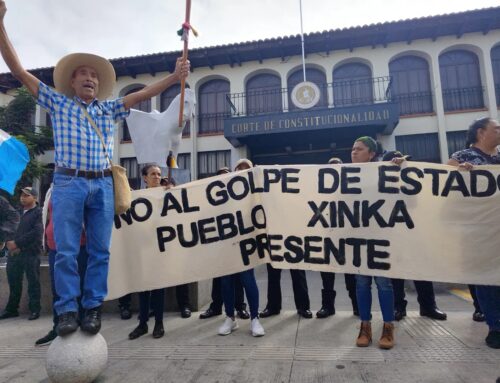
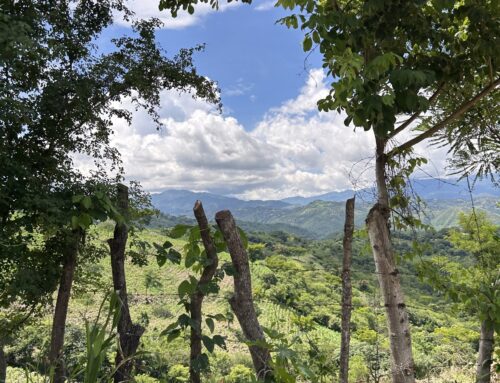
Leave A Comment